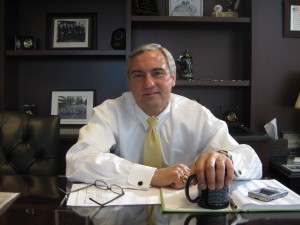
WASHINGTON — A probe into the nationwide FBI test cheating scandal cited in an Inspector General report released Monday began at the Washington field office, just blocks from the Capitol.
The report, which cited widespread cheating on an open book exam nationwide, said the FBI Inspection Division in September 2009 received an anonymous complaint that three top managers at the Washington Field Office (WFO) cheated on the Domestic Investigations and Operations Guide (DIOG), which provides guidelines on surveilling Americans. The bureau allowed agents to refer to reference materials for the open book exam, but not to take it together or get the answers beforehand.

The report, while not naming names, said two special agents in charge at the Washington Field Office — Keith Bryars and Andrew Castor — had taken the open book exam together “while discussing the questions and possible answers with a legal advisor, who was present.”
It went on to say that the Assistant Director in Charge (ADIC) , Joseph Persichini Jr. was in the room, but did not take the test at the time.
“Instead, the ADIC wrote the answers and later used them to complete the exam another day.” Ticklethwire.com was the first to report on the scandal last November. Castor, Bryars and Persichini have all consistently declined to comment on the matter in the past.
The Inspector General report said one of the special agents in charge “argued, among other things, that he did not cheat because although he had asked the legal advisor to reference the sections in the DIOG for us to use to answer the question” he never asked the legal advisor ‘what the answer was to a particular question.'”

But the FBI Office of Professional Responsibility (OPR) wasn’t buying it, the report said, and concluded that he “violated basic test-taking protocols and constituted cheating.”
The OPR probe found that both SACs violated the FBI policy about making false or misleading statements by certifying in question 51 on the exam that they had not consulted with anyone on the test. OPR issued a 20 day suspension without pay for both, and a demotion to a non-supervisory pay grade of GS-13. But the punishment was stayed while they appeal.
Interesting, in the meantime, both have landed “acting” deputy assistant director jobs — one at headquarters and one at Quantico, Va. Some in the rank and file at the bureau have perceived it as a promotion — a move they think sends the wrong message.
The Inspector General report said that the lawyer who helped the supervisors cheat at WFO used “astounding lack of judgment.” OPR issued a decision to suspend him for 10 days without pay, but he has appealed that.
Meanwhile, the report said that Persichini, who headed the FBI Washington field office, “argued that he had not cheated because the answers he wrote down for his later use constituted ‘notes’, which he argued were permissible under the open-book procedures of the exam.
OPR rejected that argument and noted that he also committed a misconduct by certifying on Question 51 that he had not consulted with anyone.
It noted that Persichini retired “from the FBI after learning that the FBI proposed to discipline him, but before the FBI had reached a final decision about that discipline.” He retired last Christmas Day.
“After the conclusion of the Inspection Division’s investigation of the allegations about the WFO managers’ conduct on the DIOG exam, the FBI reported to us that it subsequently received allegations that employees in addition to those in WFO may have cheated on the exam by sharing answer keys or be receiving assistance,” the Inspector General report said.
The IG report went on to say:
“As described in this report, in our limited investigation at several FBI offices, we found that many FBI employees violated various FBI rules in connection with the exam by consulting with others, falsely certifying that they had consulted with no one, using answer sheets or study guides that provided the questions and answers on the exam, or exploiting flawed computer programming to reveal the answers on the test.”
“Several supervisors” were involved in cheating, the IG said, “including two ASACs [assistant special agents in charge], two SSAs [supervisory special agents], and a legal advisor… Almost all of those who cheated falsely certified on Question 51 (the final question of the exam) that they had not consulted with others.”
The FBI issued the following press release Monday:
Press Release
For Immediate Release
September 27, 2010
Washington D.C.
FBI National Press Office
(202) 324-3691
FBI’s Response to OIG Report on DIOG Testing
Statement of the FBI Director:
“An uncompromising commitment to integrity remains the backbone of the FBI workforce. It guides us in every aspect of carrying out our mission to protect the American public. When allegations of misconduct relating to the DIOG testing first came to our attention, we moved quickly to investigate, bringing in the Office of Inspector General (OIG). In cases where misconduct has been determined, personnel actions were taken, and that process continues. We will follow-up in each of the 22 cases the IG has found for disciplinary action, as appropriate, as well as any other allegations of misconduct.
“The vast majority of FBI employees successfully completed the DIOG training and the open-book examination that followed, in accordance with the test-taking instructions. While the Office of Inspector General has identified a number of factors that contributed to problems with the test-taking, nothing excuses the conduct of those who chose not to comply when instructions were clear.”
Background of the OIG Investigation and Report:
• The FBI issued the Domestic Investigations and Operations Guide (DIOG) in December 2008. To ensure that FBI employees understood the importance of the DIOG and were able to apply it, the FBI mandated 16.5 hours of live classroom training for employees involved in operations. Virtually every special agent and intelligence analyst, as well as many other FBI employees who support operations, attended the mandatory training within the first several months of the DIOG’s release.
• FBI employees were also required to complete an open-book test. The vast majority of FBI personnel took the open-book test through the FBI’s online “Virtual Academy” system. Unlike other Virtual Academy tests, which are primarily training aids, DIOG test protocol did not permit consultation with other employees while answering test questions. This was a first-time test protocol for FBI in-service training.
• In fall 2009, the FBI moved quickly to investigate an allegation that certain employees had not followed the DIOG test protocol and, separately, to begin looking for indicators suggesting that other employees had not followed the protocol. The FBI then referred the matter to the OIG. The OIG investigated three allegations of misconduct and a group of employees who had indicators suggesting that they had not followed test protocol. The OIG subsequently determined that 22 of those employees did not follow the DIOG test protocol or acted improperly in some other manner.
• The FBI is disappointed with the misconduct described in the report. The FBI acknowledges some responsibility for this result. The FBI did not strictly limit how field offices administered the training and testing, and the OIG found that training was not uniformly delivered across the country and testing procedures varied.
• While these issues explain some of the OIG’s findings, they do not excuse the conduct of employees who did not comply with clear instructions. The Office of Professional Responsibility will review and adjudicate the facts of cases involving misconduct and take all appropriate action.





